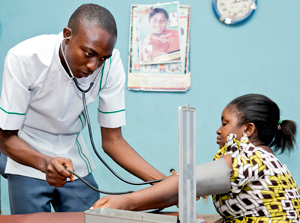
New Publication Spotlight: Assessing the Relevance, Efficiency, and Sustainability of HIV/AIDS In-Service Training in Nigeria
How can the health workforce continue to strengthen the quality and accessibility of HIV/AIDS services in Nigeria, where over three million people are living with the virus? One key strategy is in-service training to improve and update health workers’ knowledge and skills. At the request of USAID/Nigeria, CapacityPlus conducted an assessment of HIV/AIDS in-service training provided to Nigerian health workers through funding from the US President’s Emergency Plan for AIDS Relief (PEPFAR).
Findings from the study are presented in Assessing the Relevance, Efficiency, and Sustainability of HIV/AIDS In-Service Training in Nigeria, an article in the journal Human Resources for Health. CapacityPlus’s Randi Burlew is the lead author of the article, along with coauthors Amanda Puckett, Rebecca Bailey, and Stephanie Brantley, all of IntraHealth International, and Margaret Caffrey of LSTM Consulting (formerly Liverpool Associates in Tropical Health).
In-Service Training Improvement Framework The authors carried out the assessment with an online survey tool developed using the In-Service Training Improvement Framework. A total of 39 partners providing PEPFAR-funded in-service training completed the survey. The survey captured the landscape of the types of training provided; the cadres of health workers receiving training; and the processes, procedures, and resources used by partners over the period January 2007–July 2012.
The authors carried out the assessment with an online survey tool developed using the In-Service Training Improvement Framework. A total of 39 partners providing PEPFAR-funded in-service training completed the survey. The survey captured the landscape of the types of training provided; the cadres of health workers receiving training; and the processes, procedures, and resources used by partners over the period January 2007–July 2012.
Key Recommendations
Drawing on the assessment findings, the authors propose a number of recommendations for increasing the effectiveness of HIV/AIDS in-service training in Nigeria. These include 1) improving collaboration and coordination among partners; 2) applying more cost-effective training modalities; 3) funding evaluations of training programs; 4) strengthening linkages among in-service training, preservice education, and continuing professional development; 5) creating sustainability plans to transition training from PEPFAR to other funding sources; and 6) developing a training information management system.
Help CapacityPlus spread the word about strengthening the health workforce. Follow us on Twitter and like us on Facebook.
Related items:
Photo by Uko Gabriel Chukwudi (demonstration of checking blood pressure at School of Health Technology, Keffi, Nassarawa, Nigeria)


